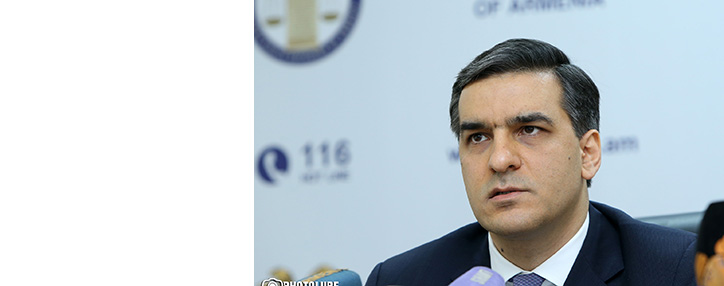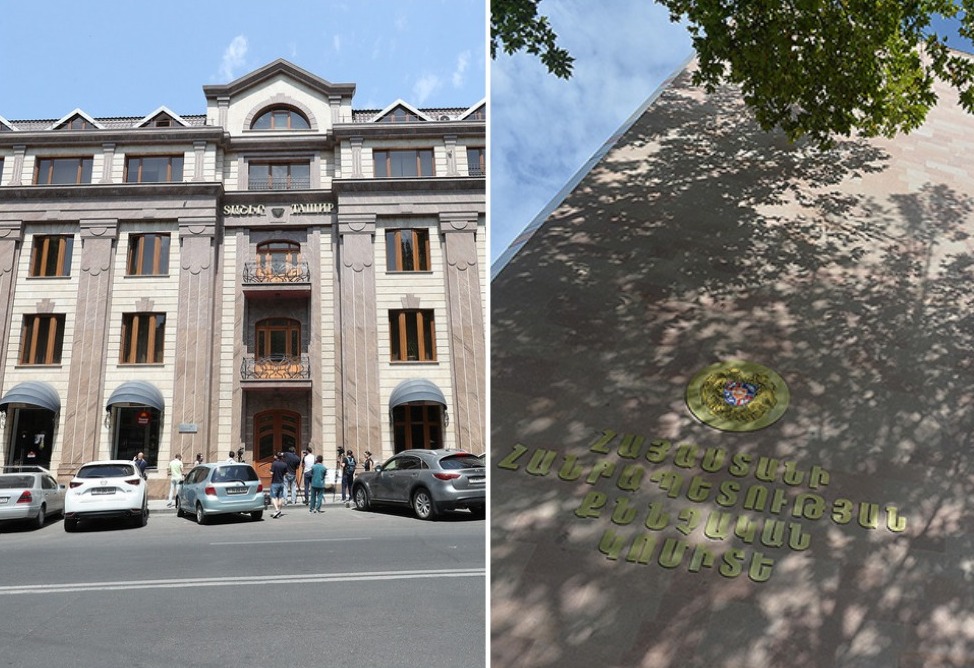Armenian ombudsman complets another stage of studying evidence of Azerbaijan's war crimes in the Artsakh war
01.12.2020,
11:31
Arman Tatoyan, Armenian ombudsman, announced the completion of the next stage of studying the evidence of the atrocities committed by Azerbaijanis against Armenian prisoners of war- military personnel and civilians, in the Artsakh war this fall.

YEREVAN, December 1. /ARKA/. Arman Tatoyan, Armenian ombudsman, announced the completion of the next stage of studying the evidence of the atrocities committed by Azerbaijanis against Armenian prisoners of war- military personnel and civilians, in the Artsakh war this fall.
"Torture and cruelty, inhuman treatment are widespread on the part of the Armed Forces of Azerbaijan, there are obvious signs of war crimes motivated by ethnic hatred," Tatoyan wrote on his Facebook page, presenting the work done by his office.
According to him, grave war crimes were committed, for which it is necessary to establish evidence as soon as possible and strengthen the grounds for bringing the Azerbaijani authorities to criminal responsibility.
"It is necessary to show, for example, how many Azerbaijani soldiers were identified in cases of this magnitude (especially since the faces of many of them are visible on video materials and photographs) or what measures have been taken to establish their identities, how many Azerbaijani soldiers are wanted, from representatives of the Azerbaijani authorities, specifically who committed what crime and what measures were taken to bring them to justice," Tatoyan said.
He stressed that the Armenian authorities should convey these important messages to our society, for which these issues are priority, as well as to the international community and the Azerbaijani authorities.
"The Azerbaijani authorities must understand that they will not go unpunished for gross violations of human rights, war crimes, systematic propaganda of hatred against Armenians and genocidal policies. We must demonstrate that every effort is being made in our country. Impunity will lead to new atrocities and torture. We must prevent this. Every day and hour is valuable," Tatoyan wrote.
Executive Authorities' Priorities
In this context, the ombudsman pointed out the fundamental role of the executive institutions of the Republic of Armenia, stressing the need for systematic and purposeful work to protect the rights of our compatriots who were in captivity.
"These issues should be among the exclusive priorities of all of us, everyone's professional potential should be used primarily for these purposes," he said. At the same time, Tatoyan remembered that on November 30, the RA government held a discussion on the investigation of criminal proceedings on other topics and issues of persons.
Tatoyan also called the participation of a number of judges and a number of members of the Supreme Judicial Council in this discussion inadmissible, which threatens the independence and authority of the judiciary.
"The courts are called upon to guarantee the protection of a person's personal freedom, to ensure uninterrupted fair trial and protection of other rights. They can effectively solve this problem only if the guarantees of external and internal independence are obvious and fully implemented," he said.
Tatoyan also noted that close cooperation has been established with human rights defenders Siranush Sahakyan and Artak Zeynalian, Artsakh Ombudsman Artak Beglaryan, as well as Armenia’s representative to the ECHR Yeghishe Kirakosyan in matters of ascertaining the atrocities of the Azerbaijani Armed Forces, protecting the rights of Armenian prisoners. "On these issues, we also cooperate with the Investigative Committee, the National Security Service and the General Prosecutor's Office of Armenia," he added.
About Situation with Prisoners and Missing
The exact data on the number of Armenians captured or missing during the military operations in Artsakh is not known. Videos have appeared on the network in which Armenian soldiers and civilians held captive in Azerbaijan are subjected to bullying and humiliating treatment. Information is also being circulated that Baku intends to take Armenian prisoners of war to the parade.
The Armenian representation to the ECHR regularly submits applications to the European Court with the requirement to request information from Baku on the number and condition of Armenian citizens held captive.
On November 23 and 27, the ECHR satisfied the statements of Armenian lawyers Artak Zeynalyan and Siranush Sahakyan in the case of protecting the rights of captured Armenian military personnel and detained civilians and took urgent measures. The ECHR requested the government of Azerbaijan to provide documented information about them and set the deadline for its submission until November 30 and December 4, respectively.
About Artsakh War
From September 27 to November 9, the Azerbaijani Armed Forces, with the participation of Turkey and foreign mercenaries and terrorists recruited by it, carried out aggression against Artsakh at the frontline and in the rear using rocket and artillery weapons, heavy armored vehicles, military aircraft and prohibited types of weapons (cluster bombs, phosphorus weapons). The strikes were delivered also at civil and military targets on the territory of Armenia.
On November 9, the leaders of the Russia, Azerbaijan and Armenia signed a statement on the cessation of all hostilities in Artsakh. According to the document, the parties stop at their positions. The city of Shushi, Agdam, Kelbajar and Lachin regions pass over to Azerbaijan, with the exception of a 5-kilometer corridor connecting Karabakh with Armenia. A Russian peacekeeping contingent will be deployed along the contact line in Karabakh and along the Lachin corridor. Internally displaced persons and refugees are returning to Karabakh and adjacent regions, prisoners of war, hostages and other detained persons and bodies of the dead are exchanged. -0-
"Torture and cruelty, inhuman treatment are widespread on the part of the Armed Forces of Azerbaijan, there are obvious signs of war crimes motivated by ethnic hatred," Tatoyan wrote on his Facebook page, presenting the work done by his office.
According to him, grave war crimes were committed, for which it is necessary to establish evidence as soon as possible and strengthen the grounds for bringing the Azerbaijani authorities to criminal responsibility.
"It is necessary to show, for example, how many Azerbaijani soldiers were identified in cases of this magnitude (especially since the faces of many of them are visible on video materials and photographs) or what measures have been taken to establish their identities, how many Azerbaijani soldiers are wanted, from representatives of the Azerbaijani authorities, specifically who committed what crime and what measures were taken to bring them to justice," Tatoyan said.
He stressed that the Armenian authorities should convey these important messages to our society, for which these issues are priority, as well as to the international community and the Azerbaijani authorities.
"The Azerbaijani authorities must understand that they will not go unpunished for gross violations of human rights, war crimes, systematic propaganda of hatred against Armenians and genocidal policies. We must demonstrate that every effort is being made in our country. Impunity will lead to new atrocities and torture. We must prevent this. Every day and hour is valuable," Tatoyan wrote.
Executive Authorities' Priorities
In this context, the ombudsman pointed out the fundamental role of the executive institutions of the Republic of Armenia, stressing the need for systematic and purposeful work to protect the rights of our compatriots who were in captivity.
"These issues should be among the exclusive priorities of all of us, everyone's professional potential should be used primarily for these purposes," he said. At the same time, Tatoyan remembered that on November 30, the RA government held a discussion on the investigation of criminal proceedings on other topics and issues of persons.
Tatoyan also called the participation of a number of judges and a number of members of the Supreme Judicial Council in this discussion inadmissible, which threatens the independence and authority of the judiciary.
"The courts are called upon to guarantee the protection of a person's personal freedom, to ensure uninterrupted fair trial and protection of other rights. They can effectively solve this problem only if the guarantees of external and internal independence are obvious and fully implemented," he said.
Tatoyan also noted that close cooperation has been established with human rights defenders Siranush Sahakyan and Artak Zeynalian, Artsakh Ombudsman Artak Beglaryan, as well as Armenia’s representative to the ECHR Yeghishe Kirakosyan in matters of ascertaining the atrocities of the Azerbaijani Armed Forces, protecting the rights of Armenian prisoners. "On these issues, we also cooperate with the Investigative Committee, the National Security Service and the General Prosecutor's Office of Armenia," he added.
About Situation with Prisoners and Missing
The exact data on the number of Armenians captured or missing during the military operations in Artsakh is not known. Videos have appeared on the network in which Armenian soldiers and civilians held captive in Azerbaijan are subjected to bullying and humiliating treatment. Information is also being circulated that Baku intends to take Armenian prisoners of war to the parade.
The Armenian representation to the ECHR regularly submits applications to the European Court with the requirement to request information from Baku on the number and condition of Armenian citizens held captive.
On November 23 and 27, the ECHR satisfied the statements of Armenian lawyers Artak Zeynalyan and Siranush Sahakyan in the case of protecting the rights of captured Armenian military personnel and detained civilians and took urgent measures. The ECHR requested the government of Azerbaijan to provide documented information about them and set the deadline for its submission until November 30 and December 4, respectively.
About Artsakh War
From September 27 to November 9, the Azerbaijani Armed Forces, with the participation of Turkey and foreign mercenaries and terrorists recruited by it, carried out aggression against Artsakh at the frontline and in the rear using rocket and artillery weapons, heavy armored vehicles, military aircraft and prohibited types of weapons (cluster bombs, phosphorus weapons). The strikes were delivered also at civil and military targets on the territory of Armenia.
On November 9, the leaders of the Russia, Azerbaijan and Armenia signed a statement on the cessation of all hostilities in Artsakh. According to the document, the parties stop at their positions. The city of Shushi, Agdam, Kelbajar and Lachin regions pass over to Azerbaijan, with the exception of a 5-kilometer corridor connecting Karabakh with Armenia. A Russian peacekeeping contingent will be deployed along the contact line in Karabakh and along the Lachin corridor. Internally displaced persons and refugees are returning to Karabakh and adjacent regions, prisoners of war, hostages and other detained persons and bodies of the dead are exchanged. -0-



